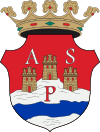Aspe
| Aspe | ||
|---|---|---|
| Town | ||

Basilica of Nuestra Señora del Socorro (17th century).
|
||
|
||
| Location in Spain | ||
| Coordinates: 38°20′44″N 00°46′8″W / 38.34556°N 0.76889°WCoordinates: 38°20′44″N 00°46′8″W / 38.34556°N 0.76889°W | ||
| Country | Spain | |
| Autonomous community | Valencian community | |
| Province | Alicante | |
| Comarca | Vinalopó Medio | |
| Judicial party | Novelda | |
| Government | ||
| • Mayor | Nieves Martínez Berenguer | |
| Area | ||
| • Total | 70.9 km2 (27.4 sq mi) | |
| Elevation | 241 m (791 ft) | |
| Population (2009) | ||
| • Total | 18,821 | |
| • Density | 270/km2 (690/sq mi) | |
| Demonym(s) | Aspenses, Aspencs | |
| Postcode | 03680 | |
| Language | Spanish | |
| Website | Official website | |
Aspe (Spanish pronunciation: [ˈaspe], Valencian: Asp) is a town and municipality located in the comarca of Vinalopó Mitjà, in the province of Alicante, Spain.
The town is located in the valley of the river Vinalopó, 25 km from Alicante city. The economy of Aspe is based on textile and footwear industries, as well as farming (vegetables and fruits).
Aspe is also famous for growing a special kind of grape, which is eaten at the stroke of midnight, every New Year's Eve, all across Spain. The grapes are eaten one at a time, according to the clock striking 12, to signal the new year.
Aspe has a small foreign population, mainly Dutch and English. The local Castilian dialect is known for dropping the "s" and seseo.
Aspe has many tradition views and during the summer large fiestas take place which are great to watch and be a part of. Every other year La Virgen De Las Nieves comes to aspe and she is the patron of the town.
...
Wikipedia


